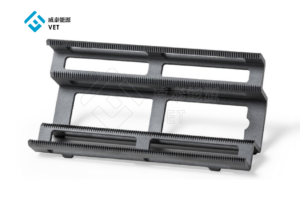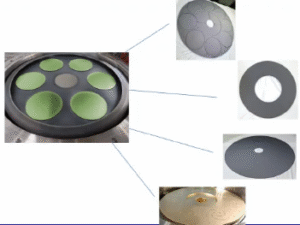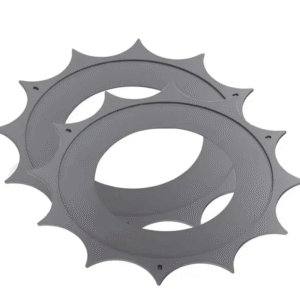なぜ業界は熱交換器のSiCチューブを選ぶのですか? 答えは驚くべき特性にあります. 耐久性 より長い寿命を保障するSiCの管の抵抗の腐食および熱衝撃として、立つ。 とりあえず 効率の効率 熱伝導性に優れ、熱伝達を促進します。 これは重要なにつながる 費用対効果 メンテナンスや運用コストを削減することで、 化学加工や発電などの産業は、これらの属性から密接に恩恵を受け、SiC管は高温および腐食性の環境に好まれる選択をします.

要点
- SiCの管の提供の例外的な耐久性、抵抗の腐食および熱衝撃は、より長い寿命および減らされた維持の必要性に導きます.
- とりあえず superior thermal conductivity 熱伝達の効率を高め、処理時間を短縮し、省エネを改善しました.
- 長寿は交換費とメンテナンスコストの頻度を削減するので、SiCチューブに投資することで、大幅なコスト効率性を実現できます.
- SiCの管はのための理想です 高圧および高温適用化学加工や発電などの厳しい環境で好まれる選択をします.
- SiCチューブの使用は、エネルギー消費量と炭素排出量を削減し、気候変動に対抗するグローバルな取り組みに合わせ、環境の持続可能性に貢献します.
- SiCチューブを選択すると、運用コストとメンテナンス費の長期節約による初期コストがオフセットされるため、投資に対する強力なリターンを得ることができます.
SiCチューブの耐久性
耐熱衝撃性
SiCチューブは、急速な温度変化に耐える方法? 答えは、独自の素材特性にあります。 炭化ケイ素かSiCは熱拡張の低い係数を所有します。 この特徴により、SiCチューブは、割れや割れることなく突然の温度変動に耐えることができます。 高温用途では、工業用熱交換器などで見つかったもの、熱衝撃に対するこの抵抗は貴重です.
「SiCチューブは高温用途の熱交換器に使用されます。 とりあえず 高い熱伝導性、熱衝撃の抵抗および化学不活性は腐食性の環境の熱を移すためにそれらを理想的にします。 ツイート
急速加熱と冷却サイクルを必要とする産業は、SiCチューブの使用から大幅に利益をもたらします。 これらのチューブは、極端な条件下でも構造的完全性を維持し、継続的な操作とダウンタイムを削減します.
耐食性
SiCチューブは腐食性環境でうまく機能しますか? 化学物質の不活性は重要な役割を果たします。 SiCの管は酸、アルカリおよび他の積極的な化学薬品からの腐食に抵抗します。 この抵抗は、過酷な条件でも、性能を時間とともに維持することを保証します.
他の材料と比較してSiCチューブの長寿は、別の重要な利点です。 従来の材料は腐食性の物質に露出したときすぐに劣化し、頻繁な取り替えおよび高められた維持費につながるかもしれません。 対照的に、SiCの管は一定した維持および取り替えのための必要性を減らすより長い耐用年数を提供します.
科学的研究ファインディング:
- シスコ 熱交換器 マーケットレポート siCの熱交換器が従来の設計と比較される維持の条件およびより長い耐用年数を削減することを強調します.
SiCの管の効率
高められた熱伝達
優秀な熱伝導性
なぜSiCチューブは熱伝達に優れていますか? お問い合わせ superior thermal conductivity. . 炭化ケイ素またはSiCは、多くの従来の材料よりも効率的に熱を伝導させることを可能にする独特な結晶構造を所有しています。 このプロパティは、SiCチューブを使用して熱交換器が迅速かつ効果的に熱を転送することができ、迅速な熱交換が重要である産業用途に最適です.
「SiCの陶磁器の管は優秀な熱伝導性を提供し、ステンレス鋼、グラファイトおよびタンタルと比較される熱衝撃に免疫があります。 ツイート
より高速な処理時間を達成し、改善することによってこの高められた熱伝達の機能からの企業の利点 エネルギー効率. . 一貫した温度を維持する能力も、システムの全体的な信頼性と性能に貢献します.
システム全体の効率への影響
SiCチューブの使用は、熱交換器システムの効率性にどのように影響しますか? 優秀な熱伝達を促進することによって、SiCの管はシステムの全面的な効率を高めます。 この改善は、希望する温度変化を達成するためにエネルギーが少ないことを意味し、運用コストを削減します。 また、SiCチューブの一貫した性能は、システム障害のリスクを最小限に抑え、中断のない操作を保証します.
省エネ
エネルギー消費量の削減
SiCチューブは省エネにどのような役割を果たしますか? 効率的な熱伝達能力は、エネルギー消費を大幅に削減します。 同じレベルの熱交換を実現するために、より少ないエネルギーを必要とすることにより、SiC管は、低エネルギー法案に貢献し、環境への影響を削減します。 このエネルギー効率は、エネルギー使用量を最適化することを目指し、業界に好ましい選択をします.
環境のメリット
SiCチューブが環境の持続可能性に貢献する方法 エネルギー消費量の削減は、直接炭素排出量の減少につながります。 エネルギーを削減することで、気候変動に対抗するグローバルな取り組みを支える、炭素排出量を削減することができます。 さらに、SiCチューブの長寿命と耐久性は、代替品と廃棄物を少なくし、持続可能な慣行と整合します.
Comparative Data:
- SSiCの炭化ケイ素の管 従来の材料と比較して長寿、効率、信頼性および費用効果が大きいを提供して下さい.
SiCチューブのコスト効果
長期費用のメリット
メンテナンスコストを削減
なぜSiCチューブはメンテナンスコストを削減できますか? 耐久性と耐摩耗性は、頻繁な修理や交換の必要性を大幅に削減します。 ダウンタイムが少なく、作業の中断が少ないことで、産業はこれに利益をもたらします。 SiCチューブの堅牢な性質により、劣化することなく過酷な条件に耐えることができます。これにより、時間の経過とともに大幅に節約できます.
「CeramTec GmbH社製SiC熱交換器チューブ」は、要求の厳しい産業用途で使用するための高性能部品です。 ツイート
これらの高性能コンポーネントは、最も困難な環境であっても、その完全性を維持し、コストリーなメンテナンス介入の必要性を最小限に抑えます.
延長寿命
SiCチューブの伸張寿命は、費用対効果にどのように貢献しますか? SiCの管の長寿は企業が他の材料として頻繁にそれらを取り替える必要がないことを意味します。 腐食および熱衝撃への例外的な抵抗からのこの延長寿命の結果。 SiCチューブに投資することで、交換や関連コストの頻度を削減する、より長い耐用年数を楽しむことができます.
SSiCの炭化ケイ素の管は例外的な特性による産業適用の広い範囲で使用されます.
さまざまなアプリケーションでSiCチューブの使用は、その信頼性と長期的価値を強調し、耐久性のあるソリューションを求める業界の賢明な投資を行います.
投資収益
初期費用対長期節約
SiCチューブを選ぶときに投資のリターンは何ですか? SiCチューブの初期費用は従来の材料よりも高くなりますが、長期的な節約は費用対効果の高い選択になります。 減少した維持の条件および延長寿命は時間の上の重要な節約に導きます。 インダストリーズは、運用コストを削減し、効率性を高め、初期投資を相殺できます.
事例・事例
SiCチューブに切り替えた化学加工工場のケースを検討してください。 工場は、メンテナンス費用とダウンタイムを大幅に削減しました。 熱交換器の効率性を高め、エネルギー消費量を削減し、コスト削減に貢献します。 この例では、SiCチューブが運用効率を改善し、コストを削減することにより、投資に対する強力なリターンを届けることができる方法を示しています.
Comparison with Other Materials
SiC対金属チューブ
耐久性および寿命
なぜ SiCチューブは耐久性に優れています 金属管と比較して? 回答は、固有の素材特性にあります。 SiCの管は腐食および熱衝撃に抵抗します、かなり寿命を拡張します。 一方、金属管は、特に腐食性の環境で、時間をかけて錆び、身につけることが多い。 この違いは、SiCチューブを使用して業界が少ない交換とメンテナンスの介入を経験し、長期的な信頼性につながることを意味します.
「SiCの陶磁器の管は優秀な熱伝導性を提供し、ステンレス鋼、グラファイトおよびタンタルと比較される熱衝撃に免疫があります。 ツイート
SiCチューブの長寿は、長時間にわたる一貫した性能を必要とする用途に好まれる選択肢となります.
熱伝達の効率
SiCの管は熱伝達の効率の点で金属管と比較しますか。 SiCの管は所有します superior thermal conductivity、それらが金属管より効果的に熱を移すことを可能にします。 処理時間を短縮し、エネルギー消費量を削減します。 熱交換器システムで最適な性能を発揮し、この熱伝達能力を発揮します.
Comparative Data:
- SiCの管 金属管と比較して効率と耐久性を向上させ、高温および腐食性用途に最適です.
SiC対セラミックチューブ
コストとパフォーマンス
コストとパフォーマンスの面で他のセラミックチューブとは異なるSiCチューブを設定する? SiCチューブは初期費用が高いかもしれませんが、その性能は投資を正当化します。 それらはよりよい全面的なシステム効率に翻訳する極度な耐食性および優秀な熱伝導性を提供します。 他の陶磁器の管は性能の同じレベルを提供しないかもしれません、増加された操作費に時間の上の導きます.
「SiCセラミックチューブは、優れた熱伝導性、熱衝撃への免疫性、金属やセラミックチューブと比較して、極端な耐食性を提供します。 ツイート
SiCチューブの費用対効果は、長期的な利点とメンテナンス要件の低減を検討する際に明らかになります.
適用 適性
どのようなアプリケーションでは、SiCチューブは、他のセラミックチューブを外していますか? SiCの管は自動車、大気および宇宙空間および化学処理を含む企業の広い範囲の使用を見つけます。 過酷な条件に耐え、性能を維持する能力は、要求の厳しいアプリケーションに適したものになります。 その他のセラミックチューブは、特定の環境での使用を制限する、同じ汎用性を提供することはできません.
Comparative Data:
- SiCの管 他のセラミックチューブと比較して、効率と耐久性を向上させるために、さまざまな業界で活用されています.
熱交換器のSiC管の適用
Industrial Applications
化学薬品の処理の使用
なぜ化学工業がSiCチューブを好むのですか? 答えは腐食および高い熱伝導への例外的な抵抗にあります. SiCチューブ 硫黄酸のような積極的な化学薬品を容易に扱い、それらを化学処理で必要としました。 高温や圧力に耐える能力は、最適な反応条件を維持するために重要な効率的な熱伝達を保証します。 この耐久性は維持の必要性を減らします、連続的な操作を可能にし、ダウンタイムを最小にします.
「SiCベースの熱交換器は、硫酸を処理するための化学工業で一般的に使用されています。 単純性、固有の強度、高圧力や温度を処理する能力、そして簡単なサービスのために人気があります。 ツイート
発電における役割
SiCチューブは発電にどのように貢献しますか? 高い熱伝導性および熱衝撃の抵抗は発電所の熱交換器にとってそれらを理想的にします。 これらの特性は、熱エネルギーを電力に変換するために不可欠である効率的な熱伝達を有効にします。 SiCの管は極端な条件の下で性能を維持し、信頼できる操作を保障し、システム故障の危険性を減らします。 この信頼性は、エネルギー要求を満たすために不可欠である一貫した出力をサポートしています.
新興用途
熱交換器の設計の革新
SiCチューブと熱交換器の設計でイノベーションが生まれていますか? エンジニアは、SiCのユニークな特性を最大限に高める新しい構成を探求しています。 これらの設計は熱伝達の効率を高め、エネルギー消費を減らすことを目指しています。 SiCの高熱伝導性と耐腐食性を活用することで、要求の厳しい環境での性能向上を実現します。 この進歩は、プロセスを最適化しようとする産業の新しい可能性を開きます.
今後のトレンド
熱交換器でSiCチューブを期待できる未来のトレンドは? 持続可能性を優先する業界として、エネルギー効率の高いソリューションの需要が高まります。 SiCの管は、長い寿命および減らされた維持の条件と、この傾向と合わせます。 過酷な環境で効果的に動作する能力は、再生可能エネルギーシステムや高度な製造プロセスなどの新興アプリケーションに適しています。 SiC技術の継続的な発展は、イノベーションと効率性を促進し、さまざまな分野での使用を拡大することを約束します.
環境への影響
SiCチューブのサステナビリティ
環境に優しい製造プロセス
SiC管は環境の持続可能性に著しく貢献します 環境に優しい製造プロセス. . メーカーは生産中の廃棄物や排出量の削減を優先します。 先進技術を採用し、エネルギー消費を最小限に抑え、SiCチューブの生産が持続可能な慣行と整列することを確認します。 環境に配慮した製造へのコミットメントは、産業汚染を削減するために、グローバルな取り組みをサポートしています.
「SiC熱交換器は、エネルギー効率や排出量削減など、環境上のメリットを提供します。」 – – LinkedIn 記事
SiCの管の生産は従来の材料と比較して少数の有害な化学薬品を伴います。 化学使用量を削減し、エコフレンドリー性を高めます。 SiCチューブを選ぶことで、環境に恵まれた持続可能な製造慣行をサポートします.
カーボンフットプリント削減への貢献
SiCチューブは重要な役割を果たしています カーボンフットプリントの削減 産業業務 優秀な熱伝導性および効率はより低いエネルギー消費に導きます。 エネルギー使用量を直接削減し、炭素排出量を削減します。 SiCチューブを採用した産業は、環境への影響を大幅に低下させ、気候変動に対抗するグローバルな取り組みに貢献します.
「CeramTec GmbHによるSiC熱交換器チューブは、要求の厳しい産業用途向けの高性能部品です。」 – – ビジネス・リサーチ・インサイト
SiCチューブの長寿命化により、持続性にも貢献します。 Fewer の取り替えはより少ない無駄および資源の消費を意味します。 熱交換器の寿命を延ばすことにより、SiC管は産業が持続可能性の目標を達成するのを助けます.
規制コンプライアンス
会議業界標準
SiCの管は環境の承諾のための厳しい企業の標準を満たします。 メーカーは、排出量、廃棄物管理、資源利用に関する規制を遵守します。 このコンプライアンスは、SiC管が効率的に実行するだけでなく、環境保護の目標と整列することを保証します。 業界は、高い性能を維持しながら規制要件を満たすためにSiCチューブに依存することができます.
「SiCのユニークな特性は、熱伝導性、高温抵抗、優れた耐食性を含みます。」 – – ビジネス・リサーチ・インサイト
業界標準の遵守は、SiCチューブメーカーの品質と環境の責任に対するコミットメントを反映しています。 この献身は、SiCチューブは、コンプライアンスでパフォーマンスをバランスよくするために求める業界のための信頼できる選択を維持していることを保証します.
支援グリーンへの取り組み
SiCチューブは、持続可能性の促進を目的としたさまざまなグリーンイニシアチブをサポートしています。 エネルギー効率と長寿命のアライメントは、産業カーボンフットプリントを削減する努力を伴います。 SiCチューブを選ぶことで、排出量削減と資源の節約に重点を置いた産業が取り組みます。 より持続可能な未来を育むためのSiCチューブの役割を根ざしたグリーンイニシアチブのサポート.
環境責任を優先する産業は、SiCチューブが理想的な選択であることを見つける。 規制基準を満たし、グリーンイニシアチブをサポートする能力は、持続可能性の目標を達成するための価値ある資産となります.
ニンポー VET エネルギー技術有限公司とSiCチューブ
会社概要
SiC技術の専門知識
寧波VETエネルギー技術有限公司., 先進材料分野におけるリーディングカンパニーとして、 それらは専門にします silicon carbide (SiC) 様々な産業用途において重要な役割を果たしている技術。 グラファイトやセラミックスなど、ハイエンド素材の製造・販売まで、そのノウハウを継承しています。 最先端の技術に焦点を合わせ、製品が太陽光発電、半導体、新エネルギー分野などの業界の要求に応えることを保証します.
寧波VET エネルギー技術Co.、 グラファイト、炭化ケイ素、陶磁器および表面処理を含む上限の先端材料の生産そして販売に焦点を合わせる株式会社はハイテクな企業です。 ツイート
イノベーションと品質へのコミットメントは、信頼性と効率的なソリューションを求める企業のための信頼できるパートナーとして位置しました.
品質への取り組み
ニンボVETエネルギーの事業の最前線に立ち向かう品質。 厳格な品質管理システムを遵守し、すべての製品が国際規格を満たしていることを確認します。 彼らの卓越性保証へのこの献身 SiCの管 優れた性能と耐久性を実現します。 高い基準を保ち、操業効率を高め、維持費を減らすプロダクトを顧客に与えます.
「長年にわたり、ISO 9001:2015国際品質マネジメントシステムに合格し、経験豊富な革新的な業界人材と研究開発チームをグループ化しました。 ツイート
顧客との信頼を築くだけでなく、高度な材料業界におけるリーダーとしての評判を強化するだけでなく、品質を重視しています.
製品提供
利用できるSiCの管の範囲
ニンポー VET エネルギーは多様な範囲の SiCの管 さまざまな産業必要性を満たすために設計されている。 高い熱伝導性および耐食性を要求する適用のこれらの管エクセル。 化学加工や発電などの産業は、優れた特性から恩恵を受けています。 幅広い選択は、クライアントが特定の要件に最適なソリューションを見つけることを保証します.
「プロダクトは太陽光発電、半導体、新エネルギー、冶金学、等で広く利用されています。 ツイート
包括的な製品ラインは、多様な産業課題に対する多様で効果的なソリューションを提供するというコミットメントを反映しています.
特定の必要性のための注文の解決
各業界に独自の要求があることを理解し、寧波VETエネルギーは、特定のニーズに合わせたカスタムソリューションを提供します。 専門家のチームは、クライアントと協力して開発します SiCの管 特定の課題に対処する。 このパーソナライズされたアプローチにより、ビジネスが運用目標を達成できるように、最適なパフォーマンスと効率性を確保します.
「主要材料からエンドアプリケーション製品までのR&D機能で、独立した知的財産権のコア技術とキー技術は、科学と技術革新の数を達成しました。 ツイート
Ningbo VET Energyは、カスタマイズされたソリューションを提供することで、クライアントの進化するニーズにお応えし、技術の進歩の最前線に残ることを保証します.
なぜ業界が一貫して熱交換器にSiCチューブを選ぶのですか? その答えは、その優れた特性にあります。 シスコ 管は熱および機械圧力を両方抵抗する比類のない耐久性を提供します。 エネルギー消費を削減しながら、システム性能を向上し、優れた熱伝導性を発揮します。 メンテナンスの必要性や寿命を延ばすことにより、コスト効率性が向上します。 他の材料と比較されて、SiCの管はそれを要求する適用のための優秀な選択をする高圧および温度を扱う能力のために際立っています。 利点のこの組み合わせは、SiC Tubeがさまざまな業界に優先するソリューションを維持していることを保証します.
よくあるご質問
SiCチューブは熱交換器に最適ですか?
シリコンカーバイド(SiC)チューブは、熱交換体に優れた特性を発揮します。 耐食性・耐衝撃性に優れ、耐久性・長寿命を実現します。 優秀な熱伝導性は熱伝達の効率を高めます、それらに化学処理および発電のような企業で好まれる選択をします.
SiCチューブは、性能の面で金属管とどのように比較しますか?
SiCの管は複数の方法の金属管をoutperform。 優秀な熱伝導性を提供し、金属よりよりよい腐食および熱衝撃に抵抗して下さい。 寿命を延ばし、メンテナンスの必要性を削減し、時間をかけてコスト効果を発揮します.
SiCチューブは高圧用途に適していますか?
はい、SiCチューブは高圧環境を効果的に処理します。 強度と円筒設計により、圧力が30バーよりも大きいとわかる。 この機能により、厳しい産業用途に理想的です.
SiCチューブの使用環境の利点は何ですか?
SiCチューブは、エネルギー消費量と炭素排出量を削減することにより、環境の持続可能性に貢献します。 長い寿命はより少ない取り替えを意味します、より少ない無駄に導きます。 また、環境に配慮した製造プロセスにより、環境負荷低減に貢献します.
SiCチューブは腐食性環境で使用できますか?
絶対に。 SiCの管は酸、アルカリおよび他の積極的な化学薬品からの腐食に抵抗します。 この抵抗は、過酷な条件でも性能を維持し、化学処理などの業界に理想的です.
SiCチューブはエネルギー効率にどのように影響しますか?
SiCの管の改善 エネルギー効率 優秀な熱伝達機能によって。 それらは望ましい温度変化を達成するより少ないエネルギーを、より低い操業費用および減らされた環境影響に導きます.
SiCチューブの熱交換器はどのようなタイプですか?
SiCの管は産業適用で普及している貝および管の熱交換器で頻繁に使用されます。 これらの熱交換器は、単純性、強度、および高圧および温度を処理する能力に好まれています.
SiCチューブの初期費用は、長期的な節約と比べてどれくらいかかりますか?
SiCチューブの初期費用は従来の材料よりも高くなりますが、長期的な節約は費用対効果の高いものになります。 維持の条件を減らし、寿命を延ばすことは時間の上の重要な節約に導きます.
SiCチューブから最も利益をもたらす特定の業界はありますか?
化学加工、発電、冶金などの産業は、SiC管から大幅に利益をもたらします。 高温や腐食性の環境に耐える能力は、これらの分野で不可欠です.
SiCチューブと熱交換器の設計でイノベーションが生まれていますか?
エンジニアは、SiC独自の特性を最大限に活用するために、新しい構成を探求しています。 これらのイノベーションは、熱伝達の効率性を高め、エネルギー消費を削減し、プロセスの最適化を求める業界の新しい可能性を開くことを目指しています.







